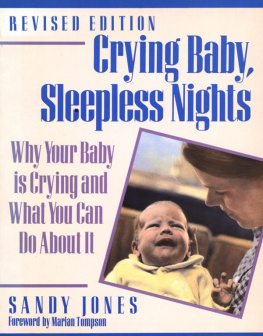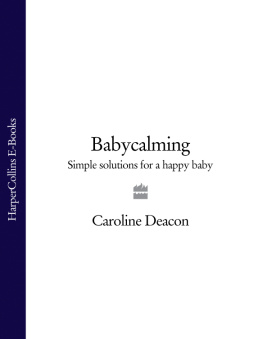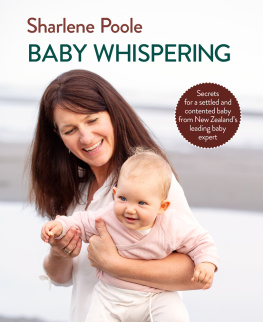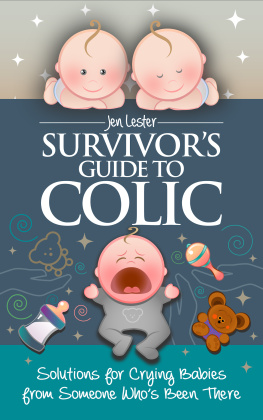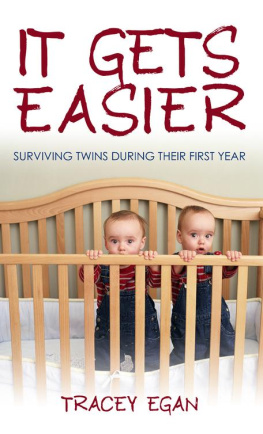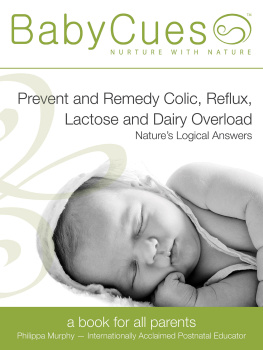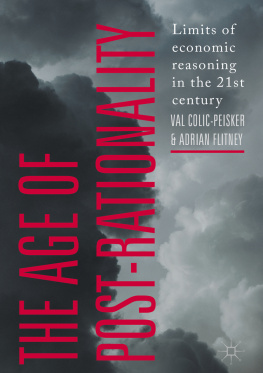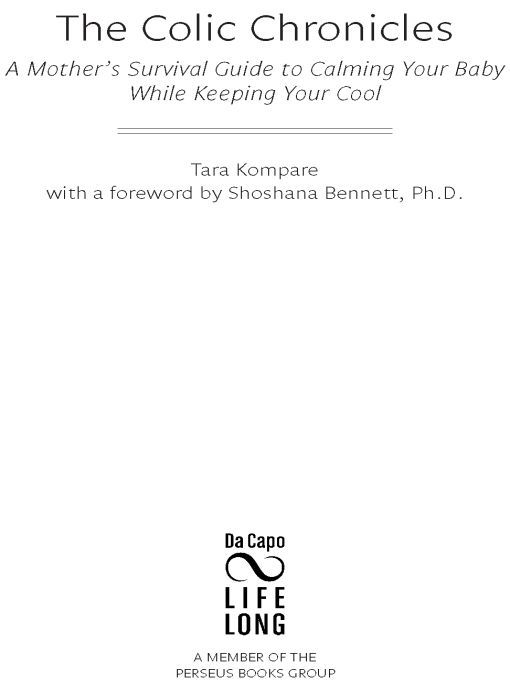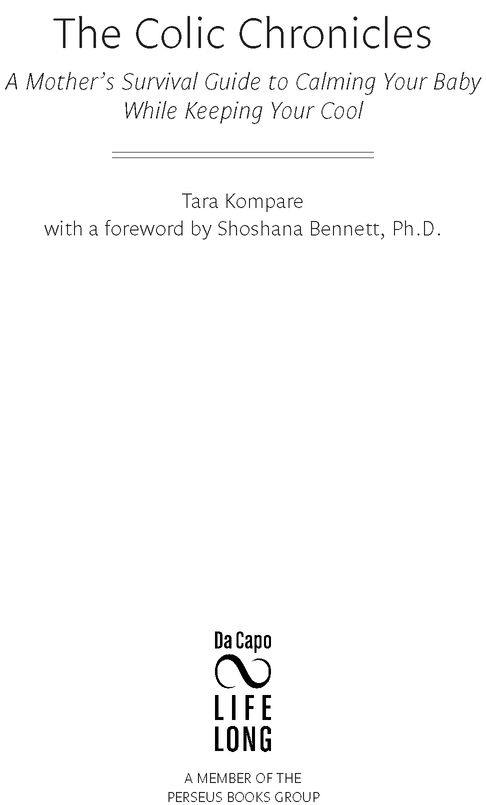Table of Contents
This book is dedicated to my two amazing little girls, Leah and Lainey, my very funny and supportive husband, Mike, and my dog, Princess, who is now in doggie heaven...
Foreword
WHILE ANTICIPATING OUR NEW BABYS ARRIVAL, I THOUGHT that life would be the same as usualplus babyand that was that. I expected that our child would sit or sleep quietly while my husband and I discussed our day. I pictured our new baby fitting easily into our calm and established schedule and adapting to our routine. If someone had warned me that during the first few months postpartum I would be jogging the perimeter of my living roombaby in the front packwhile I attempted to eat my dinner, I would have laughed at the ridiculous suggestion.
However, that was my reality. With each lap around the room, I would grab a bite of food off my plate, gulp it down as fast as possible, counting the minutes until my husband came home and could take over. I learned quickly that if I dared stop and catch my breath, blood curdling screeches and pitiful wails would emerge from my babys mouth. I felt that each cry was a personal criticism against me. With every cry, I heard my baby say, How could you? What nerve! What kind of mother are you?
To help my baby nap during the day, I would take her out for a drive... may I mention that I dreaded red lights? Or, I would place my baby in her carrier on top of the running dryer. She needed the warmth and constant motionthe bumpier the better. I would do just about anything to get her to sleep and help avoid the arched back, red-in-the face look we were all accustomed to seeing.
Having an infant with high needs makes the already taxing job of parenting much tougher. Those ruthless, punishing lies about motherhood, including,Good mothers have babies who dont cry and Good mothers know how to soothe their baby, can beat down the best of us if were not careful.
Postpartum depression and anxiety is caused primarily by biochemistry, and it can occur regardless of how much our babies cry. However, having a baby with colic can make depression and anxiety much worse. I have worked with thousands of mothers whose main psychosocial factors contributing to their depression were burnout, depletion of energy, and feelings of failure while caring for a high-needs infant.
Thank goodness for The Colic Chronicles. Finally, we have a resource that directly focuses on this serious and frequent stressor. The Colic Chronicles dives into the raw feelings of caring for a baby with colic, and does so with a skillful blend of honesty, sensitivity, wisdom, and levity. Although The Colic Chronicles wasnt written in time to help me as a new mother, you and those you love, thankfully, can take full advantage. Enjoy!
Shoshana Bennett, Ph.D. Author, Postpartum Depression For Dummies
Acknowledgments
I WOULD LIKE TO PROVIDE A VERY WARM THANK YOU TO THE following individuals:
To my girls and my husband, for allowing me the time necessary to compose this book.
To Ms. Angela Lehman-Rios, editor of Richmond Parents Monthly, for helping me become a published writer. It was in her magazine where my childrens health column, The Medicine Mom, first appeared.
To my agent, Ms. Lauren Galit, who played an instrumental role in landing a wonderful contract with such a reputable publisher. She was with me every step of the way.
To my very enthusiastic editor, Wendy Holt Francis, and to all of the wonderful people at Da Capo Press, thank you for helping me create my third child.
To Ms. Jodi Brown, of the National Center for Shaken Baby Syndrome, for providing me with some important resources for parents and for doing her part to help protect the lives of our children.
To Mr. George Lithco, founder of The SKIPPER Initiative, for not only sharing some important insight into the world of Shaken Baby Syndrome prevention but also for his work as a devout childrens advocate.
To Dr. Shoshana Bennett, Ph.D., author of Postpartum Depression for Dummies, for graciously offering her expertise in the postpartum depression arena and for taking the time to help me better understand the impacts PPD has on families.
To Suzanne P. Reese, author of Baby Massage, for enlightening me on the benefits that baby massage offers both mother and child. She is an amazing humanitarian and champion for childrens rights, and I wish her the best.
To Nancy Peterson of the Humane Society of the United States, for her invaluable information regarding the best ways to prepare your dog for a new baby, and also for her personal advice concerning my dog, Princess.
Introduction
YOU FEEL AS IF YOURE ABOUT TO LOSE CONTROL. YOUR BABY wont stop crying and youre tired, hungry, and all alonenot to mention you probably cant remember the last time you took a shower, but thats the least of your worries. What matters most is figuring out how to get your baby to stop screaming her head off! Youve tried everything, but nothing works. Hunger, soiled diapers, and teething have all been ruled out. Youve read all the right books, watched the best videos, and enrolled in parenting classesyet all of your attempts at soothing your baby have failed, miserably. When you look in the mirror, all you see is a failed mother.
Sound familiar? I am a colic survivor, and if you can relate to any of the above, then you may very well also be dealing with a colicky baby. My mission is to help you learn how to care for yourself so that you, in turn, are better able to care for your fussy, difficult-to-soothe baby.
This book is for any new mother who is struggling to take a shower in peace, who is forgetful in every sense of the word, and who is constantly yearning for a few more hours of sleep. You will learn about my life with Lainey, my colicky infant, and youll also learn from my mistakes (such as why its important never to broil anything unless youre ready for a five-alarm fire!).
For those of you who arent sure whether or not your baby has colic or if there is, in fact, an underlying medical cause for your infants cries, its best to seek a doctors expert opinion. Although most often the cause of inconsolable crying in newborns is due to colic, your doctor can first rule out certain health conditions, such as reflux or infection, that might be the source of your babys fussiness.
So, whats the definition of colic? Colic is most often defined using the rule of threes: crying for more than three hours a day, more than three days a week, and for longer than three weeks, coming from an otherwise healthy and well-fed infant. A colicky babys symptoms include high-pitched screams, a flushed face, clenched fistsand bewildered mothers. Alas, theres no known cause or cure (I wish I could tell you otherwise!).
This same baby will appear to be a complete angel at birth, yet, the minute all of your friends and family leave, she will transform into a force to be reckoned with. Thats because colic doesnt appear until your baby approaches the two-week-old mark. Youll undoubtedly be scared silly when you hear those first colicky wails; unfortunately, hiding under the sheets wont make the crying fits disappear. Only time, typically three long months of it, offers relief.
My hope is that this book will comfort you, inform you, and make you laugh when you need it the most. True, I didnt think colic was a very funny experience while I was living it, to say the least. But, I did realize that sometimes it was critical to make light of my very dark situation. Im here to tell you that like other mothers and myself, you, too, canand will bea colic survivor. Just have faith in yourself, and make sure to take care of


